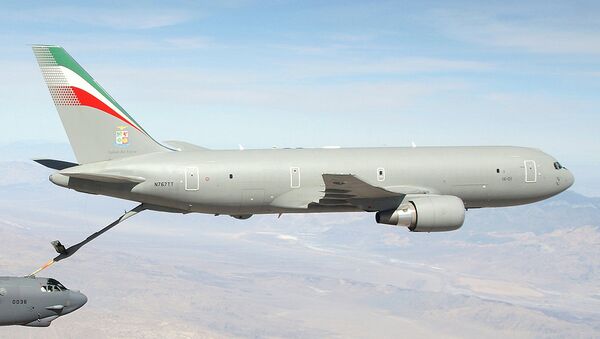A new problem that’s arisen in the KC-46’s rigorous testing could take months to fix. Locks that stop cargo pallets from sliding around inside the belly of the plane have been revealed to inadvertently unlock, sending cargo flying around the hold.
“The issue with the locks was identified. We’re working options currently with Boeing and their supplier,” Assistant Secretary of the Air Force for Acquisition, Technology and Logistics Will Roper recently told reporters, according to Defense News. “We’re looking to our operators to tell us which one of the solutions that have been identified is the one that they prefer."
The plane was restricted from carrying either people or cargo in the cargo hold in September, when the problem was first noticed during an overseas operational test and evaluation flight. A source with knowledge of the issue told Defense News at the time that while it would require all the locks on a cargo pallet to come undone, cargo shifting freely around the inside of the aircraft would not only pose a danger to people inside as well as other cargo, but the rapidly changing weight could make the plane “difficult, if not impossible” to fly.
Like the KC-135 Stratotanker and KC-10 Extender it replaces, the KC-46 is derived from a Boeing civilian airliner - the 767, in the Pegasus’ case - and incorporates a modular cargo design based on insertable pallets. The arrangement allows the Pegasus to carry passengers or various types of cargo, in addition to the jet fuel it dispenses to aircraft to extend their missions.
According to its agreement with the Air Force, Boeing is responsible for covering the costs of fixing this and other mishaps, which a June Government Accountability Office report predating the discovery of the locking problem estimated might take $300 million to address.
The cargo lock failure is the fourth major issue faced by the Pegasus program, though. In March, the entire program was placed on hold while a problem concerning foreign object debris (FOD) rattling around inside closed compartments was investigated. Other problems have included a failure in the remote vision system, a rear-facing camera that helps the Pegasus crew guide the plane’s refueling boom in the direction of the receiving aircraft, which Boeing says could take four years to fix; a problem with the boom scraping against the aircraft that’s been judged will be solved once the camera issue is fixed; and the necessity of completely redesigning the boom itself to accommodate the Air Force’s A-10 Thunderbolt II close air support aircraft.
Boeing was awarded a $5.7 billion contract in April to make the Air Force’s next generation of mid-flight refueling tankers, delivering the first plane in June - three years behind schedule, Sputnik reported. The Air Force plans to acquire 179 Pegasus aircraft, with Israel planning on buying eight more and Japan two or possibly four.



